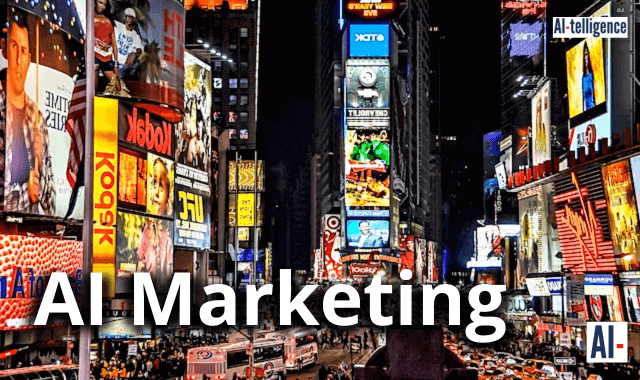How AI is Revolutionizing Marketing: A Prospective Look
 AI Marketing |
AI Marketing. Artificial Intelligence (AI) has been the buzzword in the world of technology for the past decade. It is transforming almost every industry and has the potential to revolutionize the way we do business.
Marketing is no exception. In fact, AI is set to change the face of marketing forever. With its advanced analytics, machine learning algorithms, and natural language processing capabilities, AI Marketing is enabling marketers to create personalized, targeted campaigns that deliver superior customer experiences.
We will here explore how AI is impacting marketing and what it means for the future of this dynamic industry.
Understanding AI in Marketing:
AI refers to the development of intelligent machines that can perform tasks that typically require human intelligence, such as learning, reasoning, and problem-solving.
In marketing, AI technology is used to analyze large volumes of data, identify patterns, and create predictive models that can help marketers make informed decisions.
AI-powered marketing tools use natural language processing to understand and interpret customer behavior, preferences, and intent, enabling marketers to create personalized experiences that meet the needs of individual customers.
Impact of AI on Marketing:
The impact of Generative AI on marketing is already visible in various ways. Here are some of the ways in which AI is transforming the marketing landscape:
Enhanced Customer Experience:
AI-powered chatbots are being used to provide 24/7 customer service, addressing customer queries in real time. They are also being used to recommend products and services based on customer preferences and purchase history. This personalized interaction with customers is improving the overall customer experience, leading to higher customer satisfaction rates.
Personalized Content and Marketing Campaigns:
AI-powered tools can analyze customer data and create personalized content and marketing campaigns. This ensures that the right message is delivered to the right customer at the right time, leading to higher conversion rates. For example, an AI-powered tool can analyze a customer’s browsing behavior, purchase history, and demographics to recommend products or services that are relevant to their interests.
Increased Efficiency and Accuracy in Analytics:
AI-powered analytics tools can analyze vast amounts of data in real time, providing marketers with insights that would have been impossible to obtain manually.
This has led to improved accuracy in forecasting, segmentation, and targeting, enabling marketers to make data-driven decisions and achieve better results.
Improved Targeting and Lead Generation:
AI-powered tools can analyze customer data to identify patterns and create predictive models that help identify potential customers. This enables marketers to target their campaigns more effectively, leading to higher conversion rates and better ROI.
Challenges of AI in Marketing:
While AI has the potential to revolutionize marketing, it also poses some challenges. Here are some of the challenges that marketers need to be aware of:
Data Privacy and Security Concerns:
As AI relies on vast amounts of customer data, there are concerns about data privacy and security. Marketers need to ensure that they are complying with data protection regulations and that they are using customer data ethically and responsibly.
Ethical Issues:
AI-powered tools can be used to create personalized experiences, but there is a risk of crossing the line between personalization and intrusion. Marketers need to ensure that they are not using customer data in a way that is deemed intrusive or unethical.
Conclusion:
AI is transforming marketing in ways that were once thought impossible. It is enabling marketers to create personalized, targeted campaigns that deliver superior customer experience while increasing efficiency and accuracy in analytics.
However, there are challenges that need to be addressed, such as data privacy and ethical issues. The key is regulating AI to use it in a responsible and ethical manner to reap the benefits of this game-changing technology.
As AI continues to evolve, it is likely that it will play an even more significant role in marketing. It will enable marketers to gain deeper insights into customer behavior, predict customer needs, and deliver personalized experiences that meet their expectations. This will not only improve customer satisfaction but also increase revenue and customer loyalty.

.png)
Comments
Post a Comment